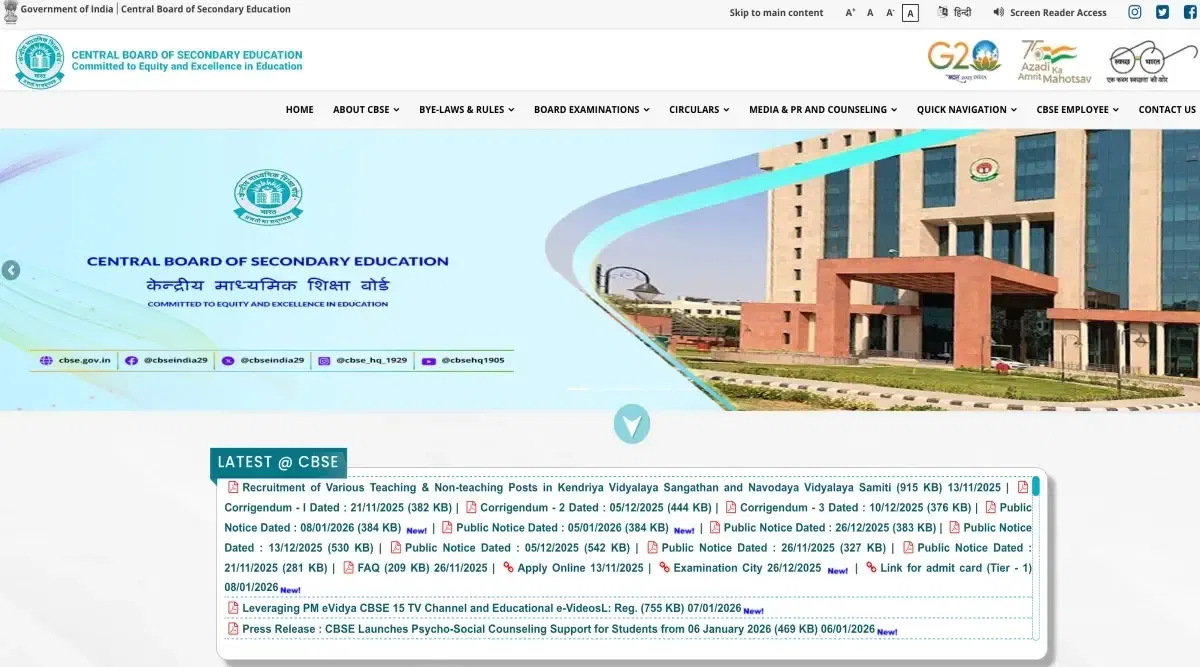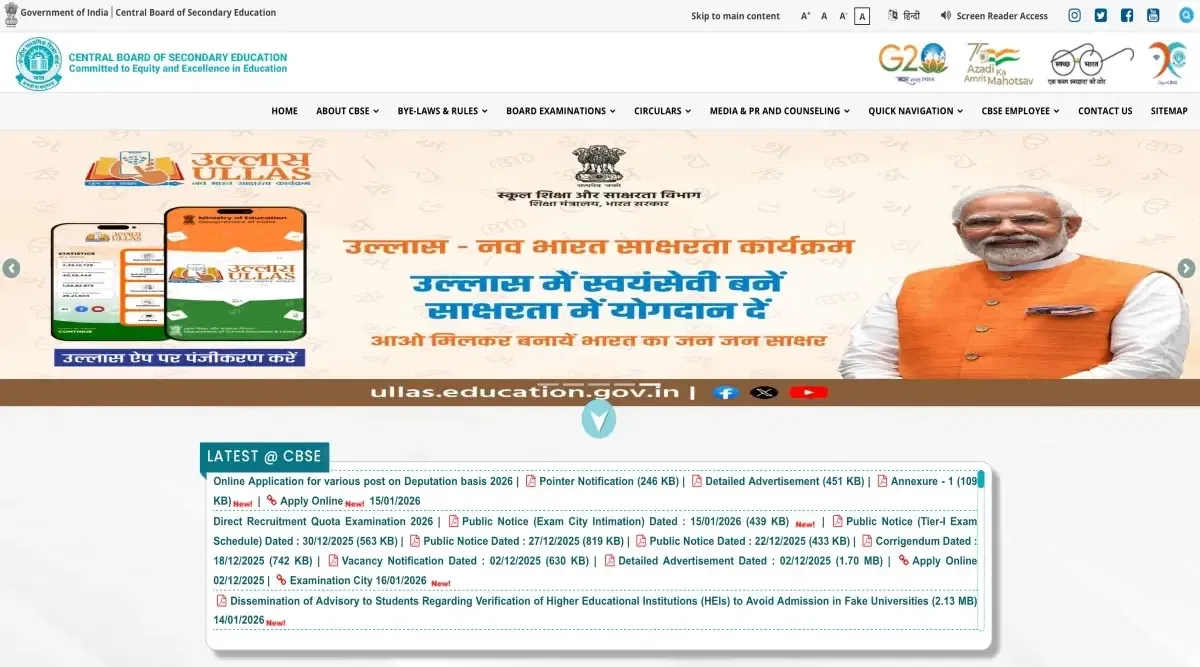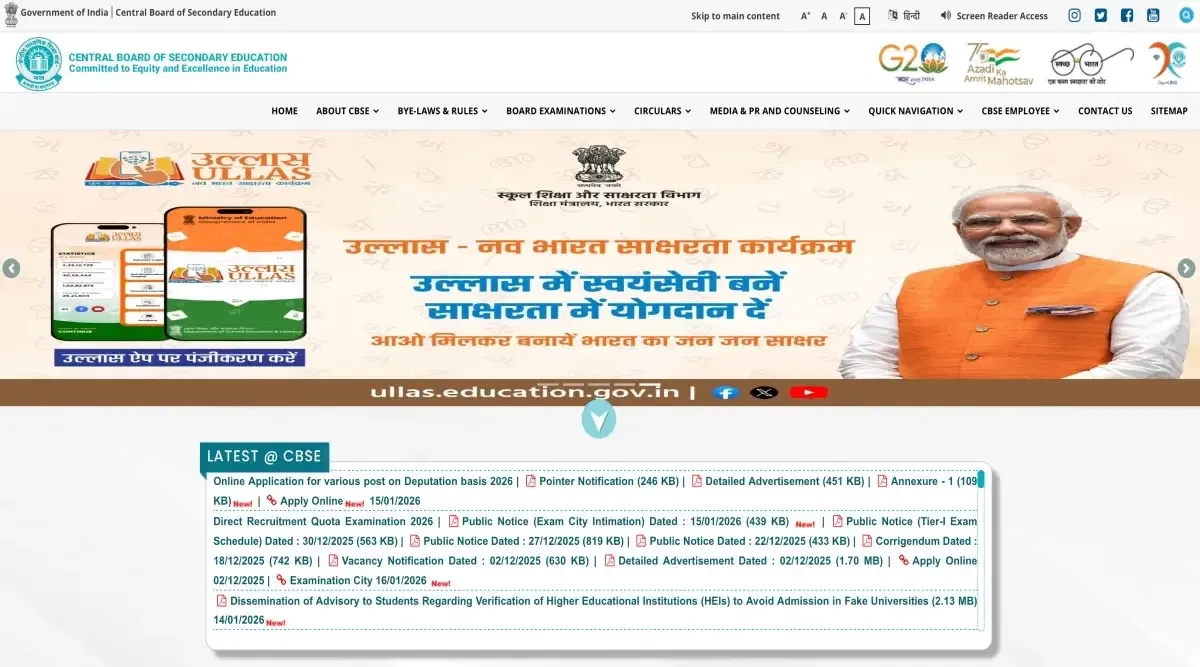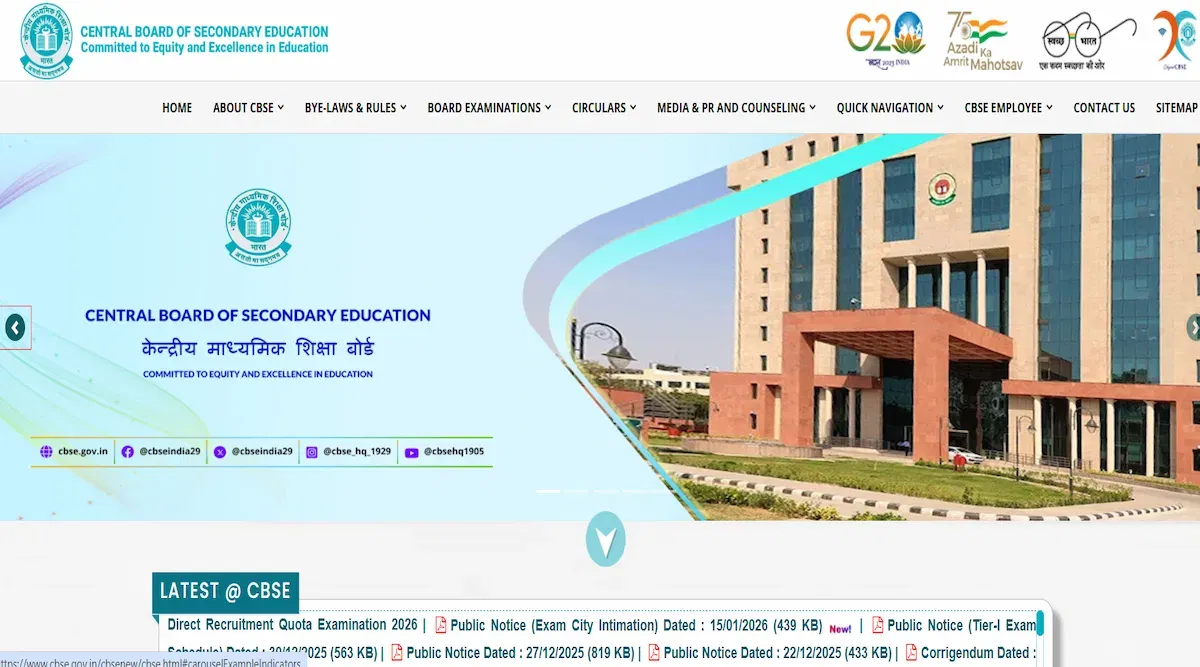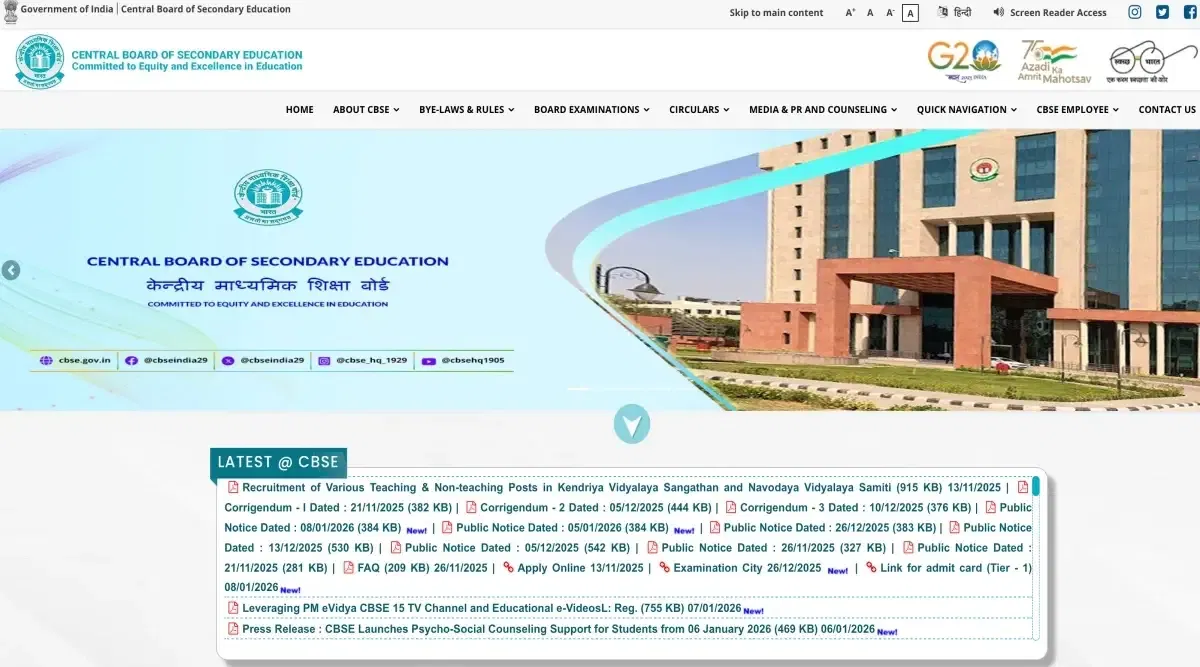CBSE Class 12 Business Studies Latest Syllabus 2025-26: Download Latest and Revised CBSE Class 12th Business Studies Syllabus PDF
Table of Contents
CBSE class 12th Business Studies syllabus 2025-26 is divided into three parts: Part A: Principles and Functions of Management, Part B: Business Finance and Marketing, and Part C: Project Work. There are 8 chapters in Part A, while Part B comprises a total of 4 topics. Students can download the Business Studies syllabus in PDF format.
Furthermore, the CBSE class 12th 2025-26 Business Studies enlists the course structure, course content, assessment details, and project details. The Business studies paper will be conducted for 100 marks, of which 80 will be given for theory, and 20 will be provided for internal assessment.
CBSE Class 12th Business Studies 2025-26: Download PDF
Students who take the CBSE class 12th Business Studies course will be better equipped to manage, evaluate, and adapt to business-related developments. The direct link to download the CBSE class 12th 2025-26 Business Studies syllabus is provided below.
| Particulars | PDF Link |
| CBSE 12th Business Studies Syllabus 2025-26 | Download Now |
CBSE Class 12th Business Studies Syllabus 2025-26: Course Structure
Students can refer to the CBSE class 12th 2025-26 Business Studies syllabus and chapter-wise marking distribution to prepare efficiently and focus more on important chapters :
| Units | Unit Name | Periods | Marks |
| Part A: Principles and Functions of Management | |||
| 1. | Nature and Significance of Management | 12 | 16 |
| 2 | Principles of Management | 14 | |
| 3 | Business Environment | 12 | |
| 4 | Planning | 14 | 14 |
| 5 | Organising | 15 | |
| 6 | Staffing | 16 | 20 |
| 7 | Directing | 15 | |
| 8 | Controlling | 12 | |
| Total | 110 | 50 | |
| Part B: Business Finance and Marketing | |||
| 9 | Financial Management | 20 | 15 |
| 10 | Financial Markets | 18 | |
| 11 | Marketing Management | 30 | 15 |
| 12 | Consumer Protection | 12 | |
| Total | 80 | 30 | |
| Part C: Project Work (One) | 30 | 20 | |
Also Check: CBSE Class 12 Syllabus 2025-26
CBSE Class 12th Business Studies Syllabus 2025-26: Unit-Wise
Business is a dynamic process that combines human initiative, natural resources, and technology in a continually shifting international environment. The updated syllabus discusses all of these features, and detailed information is provided below.
Part A: Principles and Functions of Management
Part of the CBSE Class 12th Business Studies syllabus covers the 8 units. Refer to the table below for more details.
| Concepts | Objectives |
| Unit 1: Nature and Significance of Management |
|
| Management - concepts, objectives, and importance | Understand the concept of management. |
| Explain the meaning of ‘Effectiveness and Efficiency. | |
| Discuss the objectives of management. | |
| Describe the importance of management. | |
| Management as Science, Art, and Profession | Examine the nature of management as a science, art, and profession. |
| Levels of Management | Understand the role of top, middle, and lower levels of management |
| Management functions-planning, organising, staffing, directing, and controlling | Explain the functions of management |
| Coordination - concept and importance | Discuss the concepts and characteristics of coordination. |
| Explain the importance of coordination. | |
| Unit 2: Principles of Management | |
| Principles of Management - concept and significance | Understand the concept of principles of management. |
| Explain the significance of management principles. | |
| Fayol’s principles of management | Discuss the principles of management developed by Fayol. |
| Taylor’s Scientific management- principles and techniques | Explain the principles and techniques of scientific management. |
| Compare the contributions of Fayol and Taylor. | |
| Unit 3: Business Environment | |
| Business Environment - concept and importance | Understand the concept of ‘Business Environment’. |
| Describe the importance of the business environment | |
| Dimensions of Business Environment - Economic, Social, Technological, Political and Legal Demonetization - concepts and features | Describe the various dimensions of ‘Business Environment’. |
| Understanding the concept of demonetization | |
| Unit 4: Planning | |
| Concept, importance, and limitation | Understand the concept of planning. |
| Describe the importance of planning. | |
| Understand the limitations of planning. | |
| Planning Process | Describe the steps in the process of planning. |
| Single-use and standing plans. Objectives, Strategy, Policy, Procedure, method Rule, budget, and Programme | Develop an understanding of single use and standing plans |
| Describe objectives, policies, strategy, procedure, method, rule, budget and programme as types of plans. | |
| Unit 5: Organising | |
| Concept and importance | Understand the concept of organising as a structure and as a process. |
| Explain the importance of organising. | |
| Organising Process | Describe the steps in the process of organising |
| Structure of organisation - functional and divisional concept. Formal and informal organisation- concept | Describe the functional and divisional structures of an organisation. |
| Explain the advantages, disadvantages, and suitability of functional and divisional structure. | |
| Understand the concept of formal and informal organisation. | |
| Discuss the advantages, disadvantages of formal and informal organisation. | |
| Delegation: concept, elements and importance | Understand the concept of delegation. |
| Describe the elements of delegation. | |
| Appreciate the importance of Delegation. | |
| Decentralization: concept and importance | Understand the concept of decentralisation. |
| Explain the importance of decentralisation. | |
| Differentiate between delegation and decentralisation. | |
| Unit 6: Staffing | |
| Concept and importance of staffing | Understand the concept of staffing. |
| Explain the importance of staffing. | |
| Staffing as part of the Human Resource Management concept | Understand the specialised duties and activities performed by Human Resource Management |
| Staffing process | Describe the steps in the process of staffing |
| Recruitment process | Understand the meaning of recruitment. |
| Discuss the sources of recruitment. | |
| Explain the merits and demerits of internal and external sources of recruitment. | |
| Selection – process | Understand the meaning of selection. |
| Describe the steps involved in the process of selection. | |
| Training and Development - Concept and importance, Methods of training - on the job and off the job - vestibule training, apprenticeship training and internship training | Understand the concept of training and development. |
| Appreciate the importance of training the organisation and to the employees. | |
| Discuss the meaning of induction training, vestibule training, apprenticeship training and internship training. | |
| Differentiate between training and development. | |
| Discuss on the job and off the job methods of training. | |
| Unit 7: Directing | |
| Concept and importance | Describe the concept of directing. |
| Discuss the importance of directing | |
| Elements of Directing | Describe the various elements of directing |
| Motivation - concept, Maslow’s hierarchy of needs, financial and non-financial incentives | Understand the concept of motivation. |
| Develop an understanding of Maslow’s Hierarchy of needs. | |
| Discuss the various financial and non-financial incentives. | |
| Leadership - concepts, styles - authoritative, democratic and laissez faire |
Understand the concept of leadership. |
| Understand the various styles of leadership. | |
| Communication - concept, formal and informal communication; barriers to effective communication, how to overcome the barriers | Understand the concept of communication. |
| Understand the elements of the communication process. | |
| Discuss the concept of formal and informal communication. | |
| Discuss the various barriers to effective communication. | |
| Suggest measures to overcome barriers to communication. | |
| Controlling - Concept and importance | Understand the concept of controlling. |
| Explain the importance of controlling. | |
| Relationship between planning and controlling | Describe the relationship between planning and controlling |
| Steps in process of control | Discuss the steps in the process of controlling. |
Part B: Business Finance and Marketing
The CBSE class 12th part B of the Business Studies syllabus includes 4 units which are discussed below.
| Concepts | Objectives |
| Unit 9: Financial Management | |
| Concept, role and objectives of Financial Management | Understand the concept of financial management. |
| Explain the role of financial management in an organisation. | |
| Discuss the objectives of financial management. | |
| Financial decisions: investment, financing and dividend- Meaning and factors affecting | Discuss the three financial decisions and the factors affecting them. |
| Financial Planning - concept and importance |
Describe the concept of financial planning and its objectives. |
| Explain the importance of financial planning. | |
| Capital Structure – concept and factors affecting capital structure | Understand the concept of capital structure. |
| Describe the factors determining the choice of an appropriate capital structure of a company. | |
| Fixed and Working Capital - Concept and factors affecting their requirements |
Understand the concept of fixed and working capital. |
| Describe the factors determining the requirements of fixed and working capital. | |
| Unit 10: Financial Markets | |
| Financial Markets: Concept | Understand the concept of financial markets. |
| Money Market: Concept | Understand the concept of the money market. |
| Capital market and its types (primary and secondary) | Discuss the concept of capital markets. |
| Explain primary and secondary markets as types of capital markets. | |
| Differentiate between capital market and money market. | |
| Distinguish between primary and secondary markets. | |
| Stock Exchange - Functions and trading procedure | Give the meaning of a stock exchange. |
| Explain the functions of a stock exchange. | |
| Discuss the trading procedure in a stock exchange. | |
| Give the meaning of depository services and demat account as used in the trading procedure of securities. | |
| Securities and Exchange Board of India (SEBI) - objectives and functions | State the objectives of SEBI. |
| Explain the functions of SEBI. | |
| Marketing – Concept, functions and philosophies | Understand the concept of marketing. |
| Explain the features of marketing. | |
| Discuss the functions of marketing. | |
| Explain the marketing philosophies. | |
| Unit 11: Marketing | |
| Marketing Mix – Concept and elements | Understand the concept of marketing mix. |
| Describe the elements of the marketing mix. | |
| Product - branding, labelling and packaging – Concept | Understand the concept of the product as an element of the marketing mix. |
| Understand the concept of branding, labelling and packaging. | |
| Price - Concept, Factors determining price | Understand the concept of price as an element of marketing mix. |
| Describe the factors determining the price of a product. | |
| Physical Distribution – concept, components and channels of distribution | Understand the concept of physical distribution. |
| Explain the components of physical distribution. | |
| Describe the various channels of distribution. | |
| Promotion – Concept and elements; Advertising, Personal Selling, Sales Promotion and Public Relations | Understand the concept of promotion as an element of marketing mix. |
| Describe the elements of promotion mix. | |
| Understand the concept of advertising. | |
| Understand the concept of sales promotion. | |
| Discuss the concept of public relations. | |
| Unit 12: Consumer Protection | |
| Concept and importance of consumer protection | Understand the concept of consumer protection. |
| Describe the importance of consumer protection. | |
| Discuss the scope of Consumer Protection Act, 2019 | |
| The Consumer Protection Act, 2019: Meaning of consumer, Rights and responsibilities of consumers Who can file a complaint? Redressal machinery remedies available |
Understand the concept of a consumer according to the Consumer Protection Act, 2019. |
| Explain consumer rights | |
| Understand the responsibilities of consumers | |
| Understand who can file a complaint and against whom | |
| Discuss legal redressal machinery under the Consumer Protection Act, 2019. | |
| Examine the remedies available to the consumer under Consumer Protection Act, 2019. | |
| Consumer awareness - Role of consumer organisations and Non-Governmental Organisations (NGOs) | Describe the role of consumer organisations and NGOs in protecting consumers’ interests. |
CBSE Class 12th Business Studies Syllabus 2025-26 Project Assessment
According to the CBSE class 12th Business Studies syllabus 2025-26, the marks for project work will be allocated under the following heads:
| Category | Marks |
| Initiatives, cooperativeness, and participation | 2 |
| Creativity in presentation | 2 |
| Content, observation, and research work | 4 |
| Analysis of situations | 4 |
| Viva | 8 |
| Total | 20 Marks |







![Motilal Nehru National Institute of Technology, [MNNIT] Allahabad](https://media.getmyuni.com/azure/college-image/small/motilal-nehru-national-institute-of-technology-mnnit-allahabad.webp)




















